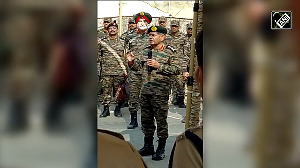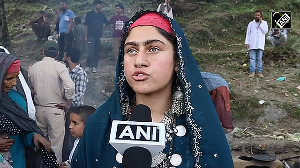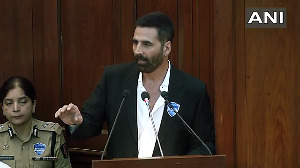"Enter with your shoes on, there is no one left to stop you," a hysterical youth surrounded by a group of wailing women shouts from a barely lit room.
In the courtyard of this mud-and-brick house there are more men and women, all crying. Nine occupants of this house were among the 24 persons -- men, women, children -- who were lined up in a neighbour's courtyard and sprayed with bullets by militants on Sunday night.
Every house in Nadimarg, a tiny hamlet in Pulwama district inhabited by only Kashmiri Pandits, is grieving.
Nadimarg had just lulled itself to sleep on Sunday night when armed men in fatigues knocked on the doors. The villagers took it for an army search operation, though search operations in this village were rare and never so late in the night.
The gunmen asked the villagers to gather in the garden of a migrant Pandit's deserted house. The assassins then showered bullets on them.
Two days later, the remnants of that Hitleresque act lie littered around the village -- Lassa Koul's crutches, a plastic shoe, a blue woollen cap, a pair of sleepers, crushed chinar leaves smeared with blood, an impotent sandbag bunker.
Beyond the killing field, now swarming with soldiers in bulletproof jackets, a dusty track leads to the heart-rending wails of men and women.
"They killed everyone here!" the disconsolate youth repeats. "Nobody will tell you to take off your shoes now!" His reference to the Kashmiri practice of taking one's shoes off before entering a drawing room is poignantly melodramatic.
"Sushma would sleep here," a girl cries, throwing herself on the unfolded bedding.
The wailing girl is Shehnaz Akhter, the angry boy is Bilal Ahmad. They were with Sushma just hours before she was killed along with her father.
The three had walked the unpaved, dusty paths of their villages, shared their small joys and little secrets. "She was my best friend, my sister," says Shehnaz, tears rolling down her cheeks.
Sushma worked with Shehnaz's sister as an Integrated Child Development Scheme worker. Shehnaz and her sisters would accompany Sushma on her trips to nearby towns and walk her back home. "We would spend most of the time together," Shehnaz says.
Sushma's was one of the nine Hindu families that had refused to migrate from Nadimarg in the early 1990s despite militant threats and that had made their Muslim friends very protective of them.
Though survivors of Sunday night's massacre like Pran Nath Bhat, who lost his mother, brother, and a nephew, speak of it as "unthinkable", talk of death had been a part of the lives of the residents of this semi-pastoral village for a long time. Similar massacres in the past and the helplessness of the majority Muslim community in protecting their friends had played on their minds.
Shehnaz, Sushma and Bilal would often talk of an unseen death. Sushma would confide her fears, her insecurity and vulnerability, to her friends. "We would tell her we will be your shield," sobs Shehnaz. "If a bullet comes your way, we will take it. But the day it happened, we could not keep the promise."
Bilal finds it hard to keep his composure for long. In his hysteria he refers to his discussions on Sufism and Hinduism with Sushma's paramedic father. "Daddy [Sushma's father] would tell me about satsangs [devotional congregations] and Shaivism. I would talk to him about Islam. He was like my father and they killed him," he says.
On the Saturday preceding the massacre, Sushma had spent the night at Shehnaz's house. The girls had chatted the night away. Sushma seemed to have had a premonition of death. "She was very scared and told us some armed men were spotted near her house," recalls Shehnaz. "We were worried, but we told her to talk about good things, like her cousin Vijay's marriage."
Vijay Bhat, 27, a teacher, had left for Jammu a week back to shop for his marriage. He returned to light his family's funeral pyres.
In the courtyard of his house, his friends and acquaintances from neighbouring villages console Vijay. Lying on a grass-mat, two Muslim youths plead with him to take some tea.
"They could have burnt my house down, taken away every valuable. But they took all the lives, they did not spare
a single person," Vijay sighs.
Vijay studied at the government college in Anantnag. He has several Muslim friends and students. The massacre, however, has left him with nothing. "What do I stay here for?" he wonders. "I never wanted to leave, but now I have to."
The government's promises of increased security in villages inhabited by the Pandits do not mean anything to Vijay; nor do the tears, the grieving faces of his neighbours. The frenzied slogans raised after every death in Kashmir sound hollow too.
The helplessness of the situation was evident in the words of Deputy Prime Minister Lal Kishenchand Advani, who visited Nadimarg on Tuesday. On the one hand he promised assistance to those wanting to migrate; on the other, he said migration of Pandits from the Kashmir Valley would be like playing into the enemy's hands.
The Muslims, though grieving with the Pandits, seem reluctant to come out in the open with their protest. "We want all this to stop," says Vijay's friend Tufail Ahmad, a teacher. "Every person you will talk to will tell you how they hate these massacres, but nobody wants to stick his neck out. Even the most secured politicians are using carefully chosen words to react to the situation. It is fear that keeps the Kashmiri Muslims indoors."
His words are heard everywhere in Kashmir. The condemnations have come pouring in, not just from mainstream parties and separatists, but even from ultra-Islamist parties like the Jamaat-e-Islami Kashmir and Jamiat-e-Ahli Hadees. But all they have is sympathy.
As far as the Pandits are concerned, they see no option but to move out of the valley. "We are in a state of shock," says Pran Nath Bhat, "but we will decide soon."
Vijay Bhatt has made up his mind already.





